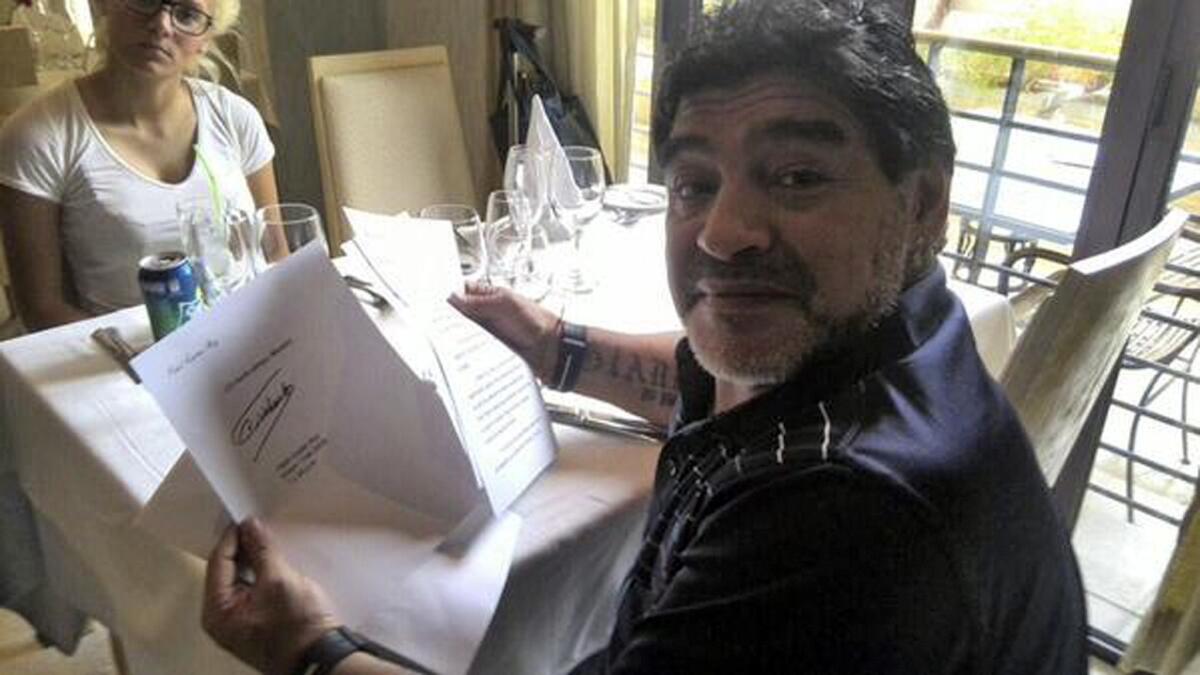Cuba’s Fidel Castro reportedly sends letter; prisoners released

- Share via
Reporting from Mexico City — Former Cuban President Fidel Castro, whose absence from public view for months has fueled rumors that he might be dead, reportedly sent a letter to Argentine soccer legend Diego Maradona, assuring his friend that he is just fine, thank you.
Meanwhile, the United States announced that Cuba had released the last of 53 jailed dissidents whose freedom was requested as part of thawing relations between the two countries -- and a momentous event that Castro has not commented on.
Venezuela’s state-run television network Telesur, reporting from Havana, on Monday showed Maradona holding aloft the purported Castro letter.
The authenticity could not be independently verified, but the letter appeared to be on Castro’s stationery, his name written in cursive on the upper left hand of each page.
Maradona is in Havana this week to tape a popular soccer television program. It was unclear how the letter reached him.
In it, Telesur reported, Castro, 88, said he was in decent health and then mused about various world events, much as he used to do in columns published by the Granma communist daily. Those too have been suspended.
Telesur did not say whether Castro commented on the recent moves toward normalization between the United States and Cuba after more than half a century of hostilities. The Cuban revolutionary leader’s silence on the matter also fed the rumors about his demise.
As part of the moves to normalize ties, Cuba completed the release of the jailed Cuban dissidents named by the U.S. government, National Security Council spokeswoman Bernadette Meehan said in Washington.
“We welcome this very positive development and are pleased that the Cuban government followed through on this commitment,” she said.
Many had been jailed for protesting the government or promoting a series of political and social reforms, she added.
The White House had refused to release the names of the 53, but Secretary of State John F. Kerry on Monday sent the list to Sen. Patrick J. Leahy (D-Vt.), who made it public.
In Havana, dissidents belonging to the Cuban Human Rights and National Reconciliation Commission said in a telephone interview that they were checking Kerry’s list against their own lists to verify who was who -- and who might still be imprisoned.
Jose Daniel Ferrer, head of another group, the Patriotic Union of Cuba, said he could confirm that about 40 people on the Kerry list were indeed freed. But he said 11 additional members of his organization remained imprisoned for political activities and were not on the list.
“We are grateful to the Obama administration for taking an interest,” he said by telephone from Havana, “but the Castro regime is not acting in good faith.”
A particularly virulent bout of rumors about Castro’s supposed death last week, emanating from Miami, never gained traction in Havana. Separately, Castro’s nephew Alejandro, who is the son of Fidel’s brother and current President Raul Castro, denied in a radio interview the rumors.
“He is in good health,” he said, according to Cuban news reports. “No need to pay attention to that type of information.”
Telesur said the confusion might have started when Fidel Castro Odinga, the son of a former Kenyan prime minister, died Jan. 4.
Times staff writers Kathleen Hennessey and Paul Richter in Washington contributed to this report.
For more news out of Mexico, Latin America, follow @TracyKWilkinson
More to Read
Sign up for Essential California
The most important California stories and recommendations in your inbox every morning.
You may occasionally receive promotional content from the Los Angeles Times.














